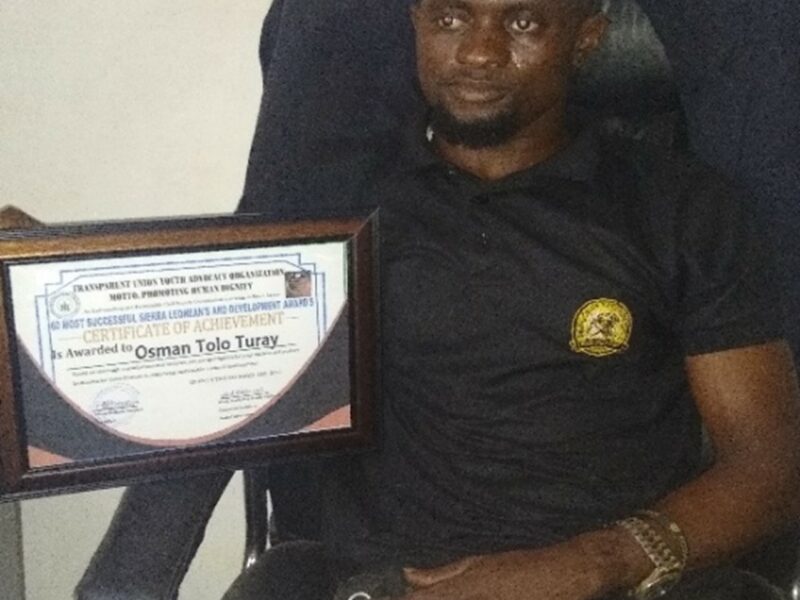Weh Dehn Say? Dehn Say Kapu Sehns Nor Kapu Word (Knowledge is More Than Mere Words)
This ground breaking book Weh Dehn Say? Dehn Say Kapu Sehns Nor Kapu Word, By: Eustace James Palmer, Abioseh Michael Porter and others, [Publisher: African World Press Inc., ISBN; 1-59221-645-5] comprising a vast array of Sierra Leonean Literature, terminates a perennial indictment that Sierra Leoneans have not been seriously in pursuit of a literary and artistic tradition. This crucial appraisal of the works of earlier and burgeoning indigenous writers includes the work of: Davidson Nicol, Sarif Easmon, Lemuel Johnson, Syl Cheney-Coker and Alhasan Mansaray. However, the lineup of writers is in no way exhaustive. Their works are evocative of national pride and dignity, realizing that this tiny West African nation has made some strides, i.e., contributing its fair share to literary and cultural milieu of Africa and world literature. These analyses tunnel at the crossroads of Sierra Leone’s wonderful and exotic mélange of a rich and very diverse culture, with its artistic history and destiny.
Although the nation’s literary artists still trail Nigerians, by a wide gap, who came to Sierra Leone, then the ‘Athens’ of West Africa, to obtain higher education. But why should the mantle of change in leadership wedge such dramatic shift? The advent of Sierra Leone’s decade-long gruesome civil war served as the catalyst that boosted the nation’s literary expediency to undergo metamorphosis, if not teetering on the brink of a renaissance. Increasingly, Sierra Leoneans are becoming more and more vocal. Finally, our folks are realizing the need to write, and increasingly more comfortable in expressing themselves through literary means. Naturally, budding, homegrown writers are emerging at home and around the world. Before, and after independence, writing and publishing were generally left to foreigners, most of whom were Nigerians. The nation’s textbooks were written by these authors. Nigerians really dominated this market. It will take time, sacrifice, with risks to break this mindset of complacency, in order to reverse this trend.
Scholars like researchers have endured difficulty in locating the paucity of books written by Sierra Leonean writers, whose work are either out of print or never went beyond the bare manuscript stage. This comprehensive pioneering journey oscillates the pendulum of change, by showcasing the work of many Sierra Leonean writers in this well researched, modest size reference book. Since this work is in no way complete, hopefully it might serve as the genesis of more ambitious projects to emerge later. A nation is measured through the prism of its cultural and socio-political framework, crafted by those who interpret and preserve it. Serious writers need our support as much as they need our criticism. The writers with enthralling voices and startling insights, are overburdened with the urge to tell a compelling story, without second guessing, and convinced that the risk is worth taking.
Syl Cheney-Coker is considered ‘Sierra Leone’s foremost writer and one of Africa’s major poets.’ His published collections of poetry include Concerto for an Exile, (1973), The Graveyard Also Has Teeth, (1980), and The Blood in the Desert’s Eye (1990). And his impressive novel The Last Harmattan of Alusine Dunbar (1990) won the prestigious Commonwealth Writers’ Prize in 1991. Despite nesting this accolade under his belt, he’s barely known in Sierra Leone: even though his book became a prescribed text at the University of Sierra Leone. Cheney-Coker is more popular in Nigeria where he taught creative writing for many years, than in his homeland. He’s labeled the angry poet, who passionately expressed doom and despair, traced back to his exile and alienation from his motherland that he loved, but left for so long. His expression of disgust due to the malaise in his homeland and the African continent, indicts him as much as it torments his aching soul. Fearlessly, he questions the heartless masquerade of brutality and tyranny that African Leaders create. They get filthy rich, while neglecting the toiling and starving populace. One of Cheney-Coker’s poems; Concerto for an Exile: resonates squarely to Sierra Leoneans and Argentineans, who have endured the ugliness of a brutal civil war.
And the guns roared on
in Sierra Leone and Argentina
to plunder the tree of agony
in my soul
Syl Cheney-Coker’s innate passion and intuition, so generously lavished in his writings, transcends cultural, mental and geographical barriers.
Alhasan Mansaray is a young, promising and gifted writer, worth waiting for. He stormed the literary world with his debut novel, A Hunting Heritage – this is a brilliant journey depicting the séance of story-telling through the eyes of a traditional Griot: his craft is interwoven with songs that make melody in the heart, mind and soul. He speaks directly to African immigrants pursuing fleeting greener pastures beyond their homeland, not to abandon their rich cultural legacy, later to lose their precious souls.
Like Cheney-Coker, Mansaray’s passion for writing runs deep; unlike a fleeting writer with a selfish motivation to write. The Father of African Literature, Chinua Achebe describes Mansaray’s intriguing novel as the Sierra Leonean version of Things Fall Apart. Mansaray met a fine African American poet, Willie James King, while passing through Alabama. He must have been amused by King, as he directed me toward Willie James King, when I first made contact with him. King’s glowing guiding light influenced my craft as well as a renewed passion for writing. Writers need peers to share and critique each other’s work, to produce a seasoned manuscript. I believe Mansaray would publish again, hopefully a blockbuster work of art that compensates for his momentary absence and silence.
Injustice would be done not to mention the nation’s visionary and brilliant playwrights: including Yulisa Maddy, Toni French, Dele Charley, John Kolosa Kargbo and Clifford Garber who like flies on the wall were motivated by the nation’s endemic ills especially its political enigma by fanning the flames of consciousness and awareness through their plays: even at the expense of their safety and freedom. The contributions of entertainers like Ebenezer Calendar, Salia and S.E. Rogers to Sierra Leone’s multi-faceted cultural heritage should not be underestimated.
Eustace Palmer, Abioseh Porter and others have crafted a brilliant page-turner, which scholars, researchers, or anyone searching for Sierra Leonean Literature; or those seeking to tap the genius of its artists and writers might appreciate Knowledge is More Than Mere Words. This treasure is a priceless addition to any library. I find it to be smooth, enjoyable and irresistible read. This is a book I would return to again and again. I am almost certain that every reader of this fine book will luxuriate in its varied, and much needed revelations. I strongly recommend this book to everyone.
Roland Bankole Marke is a Sierra Leonean author, poet and songwriter with 3 books under his belt: Harvest of Hate: Stories and Essays (fuel for the soul), Silver Rain and Blizzard, and Teardrops Keep Falling. Marke has also published a catalogue of articles, short stories and poetry published around the world. He lives and writes in Jacksonville, Florida, USA. Navigate his website: www.rolandmarke.com
Stay with Sierra Express Media, for your trusted place in news!
© 2010, https:. All rights reserved.






